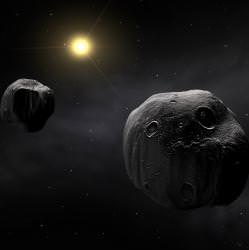 Astronomers have turned up many binary asteroids in the Solar System. Instead of a single, solitary spacerock, you’ve got two objects orbiting a common centre of gravity. A new paper published in the 2007 issue of the journal Icarus focuses on one of these double objects: the binary asteroid 90 Antiope.
Astronomers have turned up many binary asteroids in the Solar System. Instead of a single, solitary spacerock, you’ve got two objects orbiting a common centre of gravity. A new paper published in the 2007 issue of the journal Icarus focuses on one of these double objects: the binary asteroid 90 Antiope.
Continue reading “Double Asteroids Revealed as Twin Piles of Rubble”
Podcast: Asteroids Make Bad Neighbours
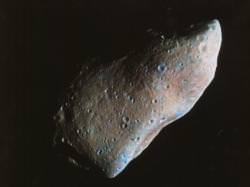 This week we’re talking about asteroids. And not just any asteroids, but Near Earth Objects. How do astronomers find these things, why are they buzzing around the Earth, what are the chances we’ll actually get hit, and what would happen if we did get hit? How could we stop them?
This week we’re talking about asteroids. And not just any asteroids, but Near Earth Objects. How do astronomers find these things, why are they buzzing around the Earth, what are the chances we’ll actually get hit, and what would happen if we did get hit? How could we stop them?
Continue reading “Podcast: Asteroids Make Bad Neighbours”
The Countries Most at Risk to Asteroid Impacts
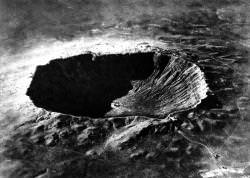 If you’re planning a move in the next few years, you might want to consider thread from asteroid impact on your list of annoyances. Researchers from the University of Southampton have modeled the consequences of asteroid strikes around the Earth, and figured out which countries would suffer worst.
If you’re planning a move in the next few years, you might want to consider thread from asteroid impact on your list of annoyances. Researchers from the University of Southampton have modeled the consequences of asteroid strikes around the Earth, and figured out which countries would suffer worst.
Continue reading “The Countries Most at Risk to Asteroid Impacts”
Asteroid Sample Return Mission Proposed
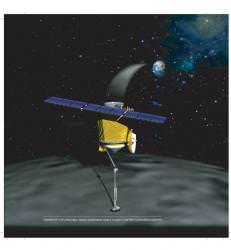 A new NASA mission is being proposed to fly out, extract a sample from a nearby asteroid, and return it to Earth. The asteroid is known as 1999 RQ36, and the mission is OSIRIS.
A new NASA mission is being proposed to fly out, extract a sample from a nearby asteroid, and return it to Earth. The asteroid is known as 1999 RQ36, and the mission is OSIRIS.
Continue reading “Asteroid Sample Return Mission Proposed”
Sunlight Puts the Spin on Asteroids
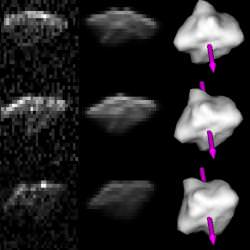 Astronomers have theorized that light from the Sun influences the speed at which asteroids spin, and now they’ve gathered the evidence to back it up.
Astronomers have theorized that light from the Sun influences the speed at which asteroids spin, and now they’ve gathered the evidence to back it up.
Continue reading “Sunlight Puts the Spin on Asteroids”
Lasers Could Deflect Future Asteroids From Impacting Earth
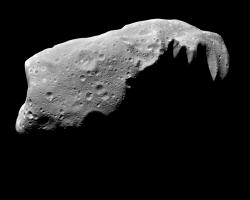 The Earth has been bombarded by asteroids in the past, and it’s going to happen again in the future. It’s not a question of “if”, it’s a question of “when”. Keenly aware of the problem, scientists are working on strategies that could prevent an asteroid with Earth in its cross hairs from impacting us.
The Earth has been bombarded by asteroids in the past, and it’s going to happen again in the future. It’s not a question of “if”, it’s a question of “when”. Keenly aware of the problem, scientists are working on strategies that could prevent an asteroid with Earth in its cross hairs from impacting us.
Continue reading “Lasers Could Deflect Future Asteroids From Impacting Earth”
Dwarf Planet Could Become a Comet
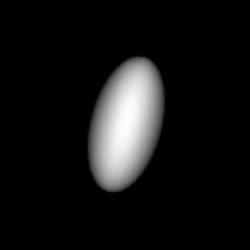 A small dwarf planet out past the orbit of Neptune could eventually become one of the brightest comets ever seen. Caltech professor Mike Brown – the discoverer of Eris – presented his calculations during the annual meeting of the American Astronomical Society held in Seattle in early January.
A small dwarf planet out past the orbit of Neptune could eventually become one of the brightest comets ever seen. Caltech professor Mike Brown – the discoverer of Eris – presented his calculations during the annual meeting of the American Astronomical Society held in Seattle in early January.
Continue reading “Dwarf Planet Could Become a Comet”
Close Call with Asteroid 2006 XG1 in 2041
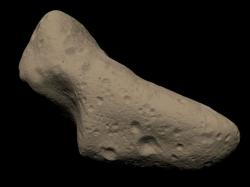 I don’t want to get you worried, or even mildly concerned. No need to panic. In fact, just read this little piece, and remark with interest that an asteroid is going to get really really close to the Earth on October 31, 2041. It might – I repeat might – have a small, insignificant chance of hitting the Earth and causing regional devastation. Like a 1 in 40,000 chance. Those are pretty good odds when you think of it.
I don’t want to get you worried, or even mildly concerned. No need to panic. In fact, just read this little piece, and remark with interest that an asteroid is going to get really really close to the Earth on October 31, 2041. It might – I repeat might – have a small, insignificant chance of hitting the Earth and causing regional devastation. Like a 1 in 40,000 chance. Those are pretty good odds when you think of it.
Continue reading “Close Call with Asteroid 2006 XG1 in 2041”
Tag an Asteroid, Win a Prize
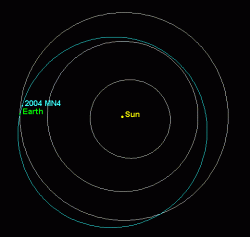 The Planetary Society is offering a $50,000 prize for the best plan to reach out an put a tracking beacon on near-Earth asteroid Apophis (AKA 2004 MN4). Apophis is approximately 400 metres across, and it’s expected to pass very close to the Earth in 2029. And on that pass, it could receive a gravitational bump to its orbit that could make it even more dangerous in 2036. With better tracking, scientists will have a much better idea if Apophis really is a risk to Earth. The competition ends August 31, 2007.
The Planetary Society is offering a $50,000 prize for the best plan to reach out an put a tracking beacon on near-Earth asteroid Apophis (AKA 2004 MN4). Apophis is approximately 400 metres across, and it’s expected to pass very close to the Earth in 2029. And on that pass, it could receive a gravitational bump to its orbit that could make it even more dangerous in 2036. With better tracking, scientists will have a much better idea if Apophis really is a risk to Earth. The competition ends August 31, 2007.
Continue reading “Tag an Asteroid, Win a Prize”
Just a Single Asteroid Strike Wiped out the Dinosaurs
Most scientists agree that a large asteroid strike 65 million years ago ended the dinosaurs’ reign on Earth. Some think that a single strike did the trick, while others think it was multiple strikes and additional stresses that pushed the dinosaurs into extinction. New evidence from researchers at the University of Missouri-Columbia supports the single impact hypothesis. They found a single layer of impact-related material in the geologic record that exactly matched marine creatures known to be contemporaries of the dinosaurs. They didn’t find any other impact evidence above or below this layer, reducing the possibility of additional impacts.
Continue reading “Just a Single Asteroid Strike Wiped out the Dinosaurs”
